Khudoni hydropower plant, Georgia
While a mountain community will have to be forced to resettle for this mega-project, the opaque ownership and weak taxation mean that benefits for Georgia are highly doubtful.
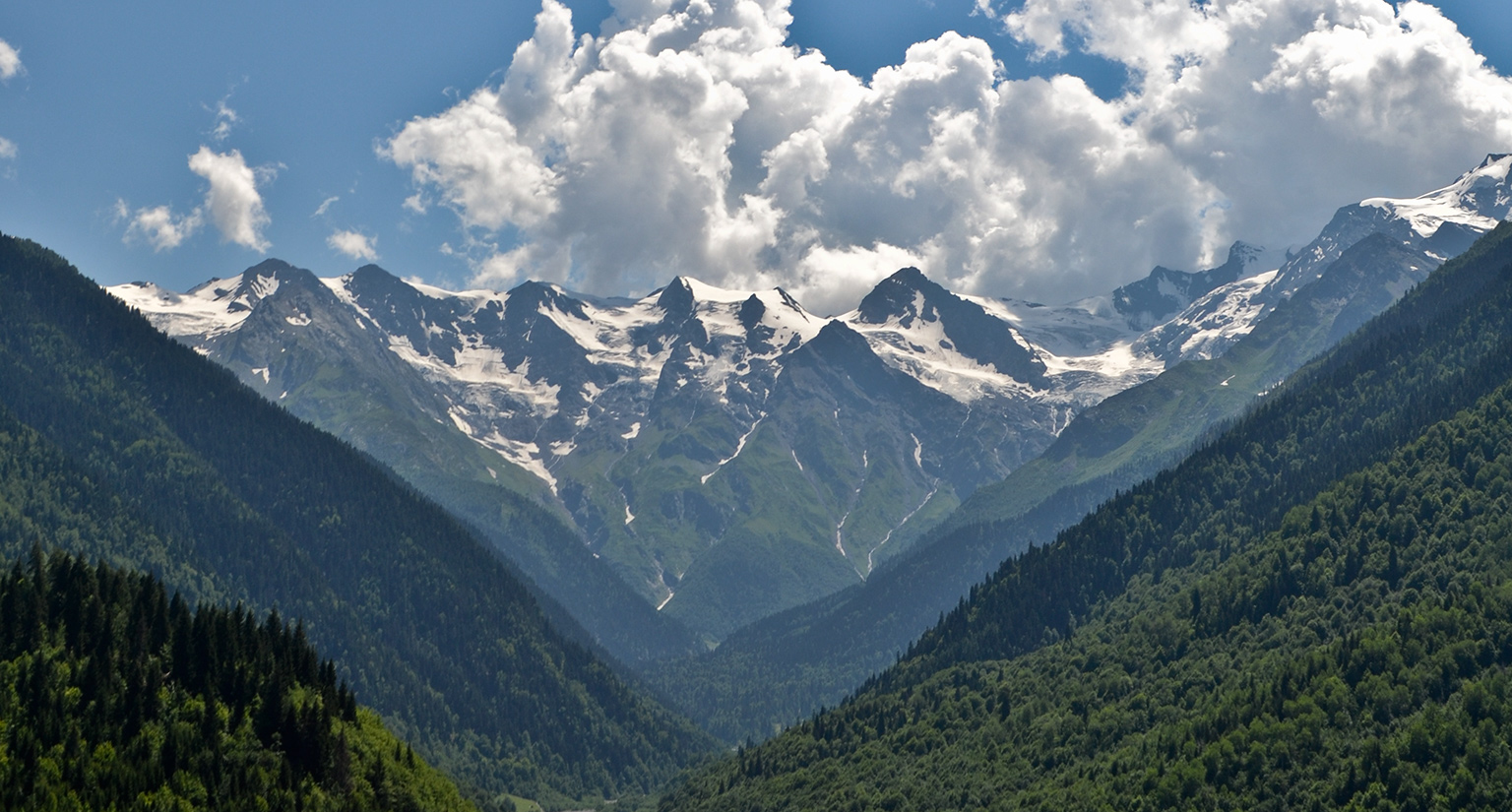
Photo: A mountain range in Svaneti, Georgia, where the Khudoni hydropower plant is to be built.
Stay informed
We closely follow international public finance and bring critical updates from the ground.
Key facts
Size and costs:
With the planned 200.5 meter-tall arch dam, an underground powerhouse, and a 528 hectare water reservoir the Khudoni HPP would become the second largest hydropower plant in Georgia.
The costs are estimated at EUR 1.06 billion (GEL 2.75 billion).
Feasibility:
The project requires the resettlement of 2000 people, will negatively affect cultural heritage and will not bring significant tax revenues for Georgia.
The positive conclusions of a feasibility study on Khudoni’s technical and financial viability are being questions by observers as well as local communities.
Promoter & financiers:
The project company’s beneficial owners are unknown, as are the financiers of the project. (The World Bank provided technical assistance for the feasibility study.)
The Georgian state provided 24 percent of the project costs without receiving a share in the project company or similar compensation.
Key issues
- About 2000 locals to be displaced by the dam. Their fierce opposition has triggered a nation-wide discussion about Khudoni. more>>
- Government responds with intimidation and PR campaigns. more >>
- Project’s benefits for Georgia’s public are very limited with low taxation and project company registered offshore. more >>
- Project likely to have adverse impacts on water streams, local culture and geological stability. more >>
Background
The 702 MW Khudoni hydropower plant (HPP) is proposed to be built on the Enguri River in the picturesque mountain region of upper Svaneti in Georgia. The area is inhabited by the Svans, an ethnic group which has retained its language and traditions over centuries.
The Khudoni HPP will resettle around 2000 people and flood some of the villages threatening to corrode traditional lifestyles of the Svans and destroy pristine nature.
Displacement and locals’ fierce opposition
The Khudoni HPP will displace around 2000 people (of the 12 000 who live in Upper Svaneti). A village to be fully resettled is Kaishi with its 800 inhabitants.
One fifth of Khaishi’s households is recorded as socially vulnerable and is living on allowances, the majority relying on agriculture for their subsistence. They fear that their situation will only deteriorate with the resettlement.
Supported by numerous other Svan communities, the people from Kaishi are fiercely opposing the Khudoni hydropower plant and have organised numerous public protests, rallies and blockades.
In 2013, 200 families of Khaishi even took a traditional oath in church, vowing they would protect Kaishi from flooding or, should they fail, face a curse that will haunt them and their families for generations.
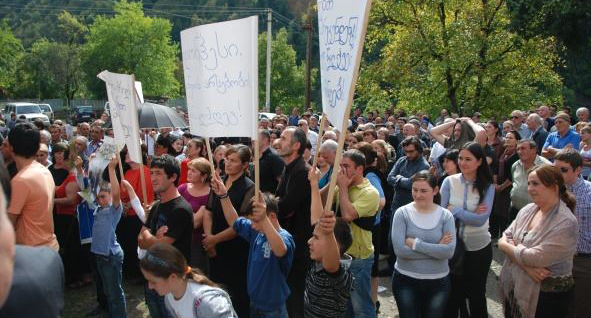
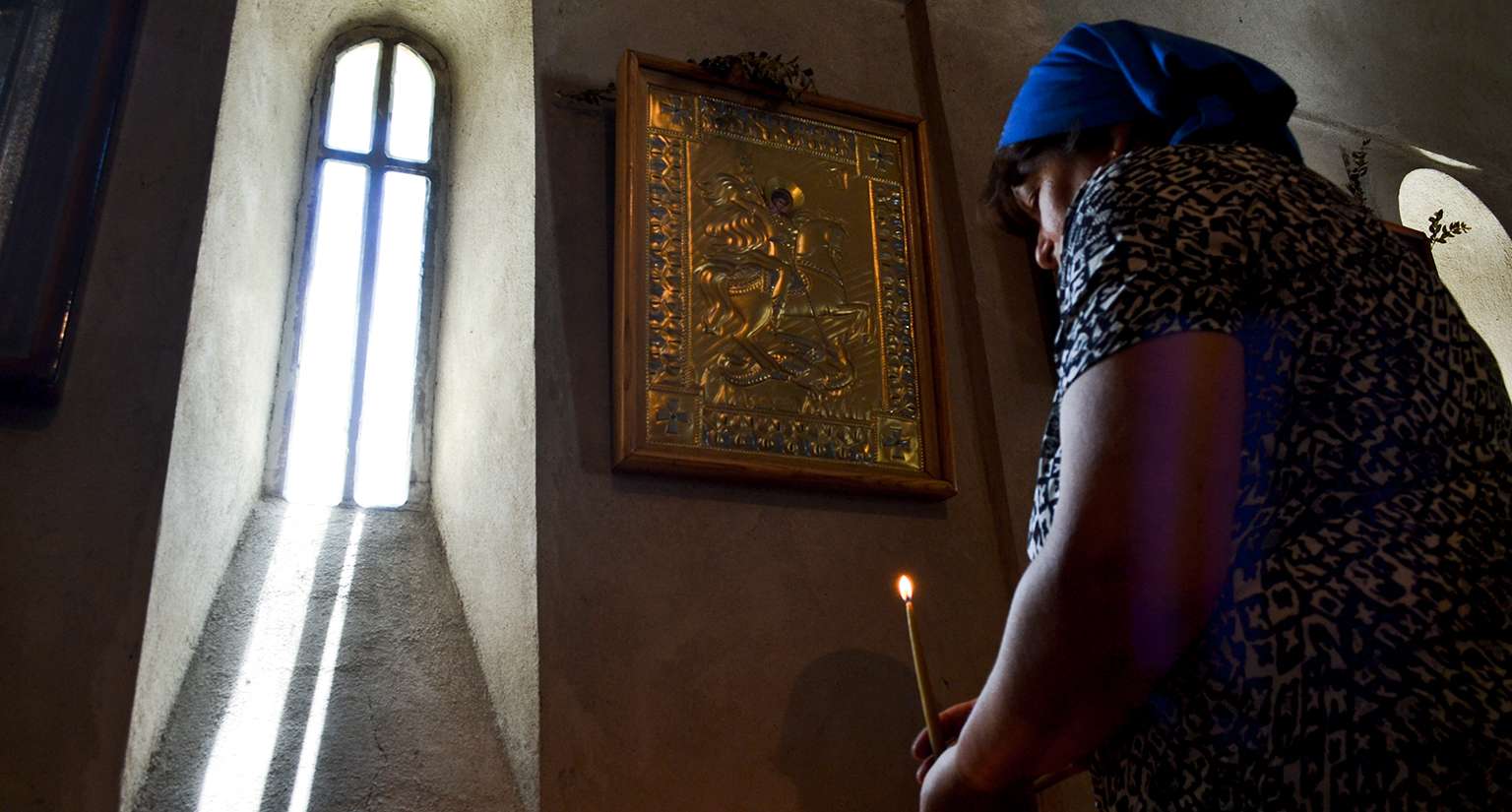
A worshiper during mass in Chuberi, a town upstream from Khaishi.
Svans are known for being proud of and closely attached to their region.
Read more
Growing solidarity with local communities in Georgia puts Khudoni dam in spotlight
Blog post | October 4, 2013
Georgian government and investors reject Ombudsman’s offer to mediate in controversy over Khudoni mega dam
Blog post | February 6, 2014
Read more
People from Kaishi are being supported by other Svans and increasingly by public opinion in Georgia, despite intensive PR campaigns by the project promoters.
Growing solidarity with local communities in Georgia puts Khudoni dam in spotlight
Blog post | October 4, 2013
Georgian government and investors reject Ombudsman’s offer to mediate in controversy over Khudoni mega dam
Blog post | February 6, 2014
Promoters of mega-dam in Georgia use front group and PR campaign and discredit local community
Blog post | February 27, 2014
Intimidation and lack of communication
The project promoters’ unwillingness to respond to locals’ concerns has further deepened the mistrust and disagreement.
The project company Trans Electrica has failed to communicate the project’s effects and has not disclosed clear plans for compensation or resettlement.
Georgian authorities, instead of working with locals, responded to protests with increased police presence and intimidation. Georgia’s deputy minister of energy even told locals before a public hearing in September 2013 that regardless of their protests, the Khudoni dam will be built anyway.
Read more:
In Georgia, dam builders do not welcome peoples’ concerns
Blog post | September 24, 2013
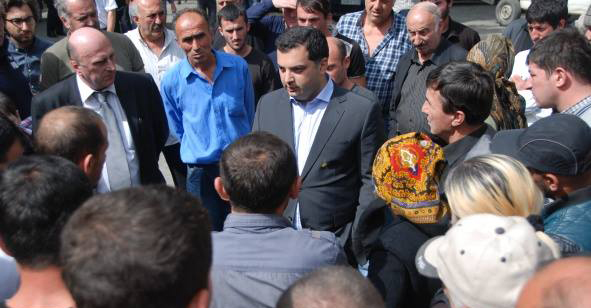
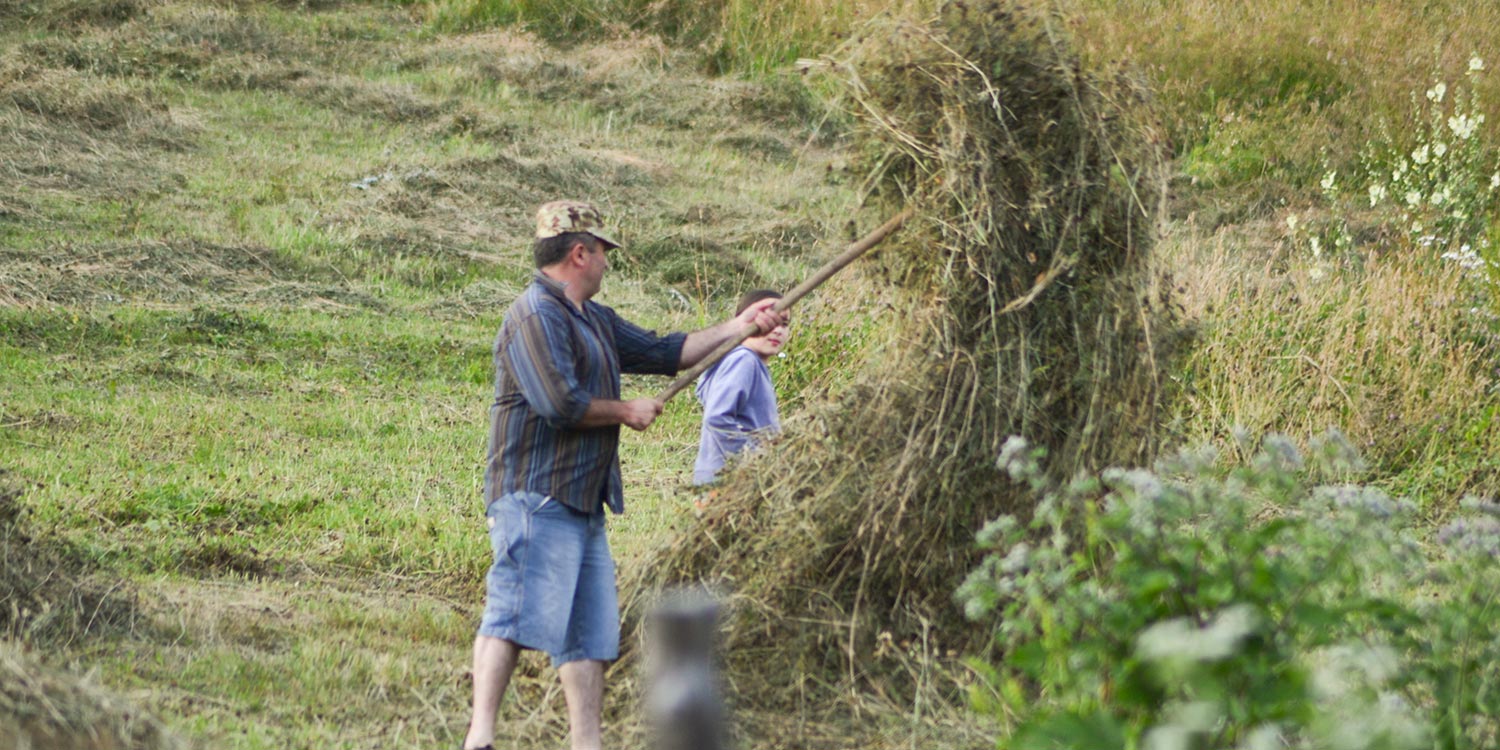
More than 1500 ha land, part of which was traditionally owned by the local population yet not officially registered, were sold by the Georgian state to Trans Electrica for one dollar.
Locals had not been informed about the deal.
Doubtful public benefits & dodgy company
Most of the benefits that the Khudoni HPP is supposed to provide for Georgia and local municipalities are highly doubtful.
Energy independence?
The contract signed by the concessionaire and the Georgian government will award 91 percent of the Khudoni generated electricity for exports. Georgia is only guaranteed to buy annually 133.9 mln kw/h (or only four days of power consumption in Georgia) at a fixed price of 5.84 US cents during the first ten years.
Tax revenues?
While electricity exports will improve Georgia’s trade balance, they will not generate fiscal benefits for the country as export is factually exempt from taxation with a tax rate of zero percent.
Apart from income tax on salaries, Trans Electrica Ltd. will only pay a property tax of 1 percent. It will not pay for the water usage.
Employment?
The experience with other Georgian hydropower projects such as Larsi, Paravani and Dariali (pdf) have shown that employment opportunities tend to be exaggerated and mostly limited to the construction phase. The operation of Khudoni will require skilled work force which is likely to come from far away.
Offshore company
The project company, Trans Electrica Limited, incorporated in the British Virgin Islands, is represented by Indian nationals who have been so far silent about the beneficial owners of the company and the sources of financing.
The terms of the agreement for the construction of Khudoni HPP on a build, own and operate basis has been changed several times by the Georgian government and Trans Electrica Ltd. The project is heavily delayed but it is unclear whether the company has paid any penalties for delayed works.
Registered in the British virgin islands, the company’s beneficial owners and the sources of financing are so far unknown.
Independent review
In 2013, the Georgian government requested the Netherlands Commission for Environmental Assessment to review the draft Khudoni HPP Environmental and Social Impact Assessment.
The group suggested
- better and transparent communication with locals,
- a social cost-benefit analysis to assess the project’s feasibility from a public perspective, and
- developing a national energy strategy that takes alternatives to Khudoni into account
Impacts on water, culture and geology
Cumulative impacts on water streams
The Enguri river already hosts the world’s sixth highest arch dam, the 1300 MW Enguri HPP, and the 240 MW Vardnili hydropower cascade.
In addition to Khudoni, nine other hydropower plants (including three large dams with reservoirs) are being planned.
When combined, the plants will have significant impacts on water resources and the environment. However, the Ministry of Energy has not assessed the cumulative impacts of these installations.
Cultural impacts
Upper Svaneti is a candidate site to be listed by the UNESCO World Heritage for its natural importance and well-preserved medieval architecture.
While the dam is outside of the UNESCO site boundaries, the construction of a hydropower plant will interfere with the cultural sites (according to the official scoping document (pdf)). Twenty-seven villages will be impacted directly and indirectly by the project, including Khaishi which is regarded as a political and cultural gateway to Svaneti.
Khaishi’s church of St. George, Lakhani’s church of St. Nicholas, a cemetery and archaeological sites will be flooded.
Seismic risks and land slides
Severe landslides, rock falls and erosion were observed upstream of the Khudoni site. Combined with the high sediment load on the Enguri River, the high geological risks could decisively shorten the lifetime of the Khudoni reservoir.
Svaneti is a seismically active zone and a possible dam failure could result in flooding of vast areas in the western part of the country.
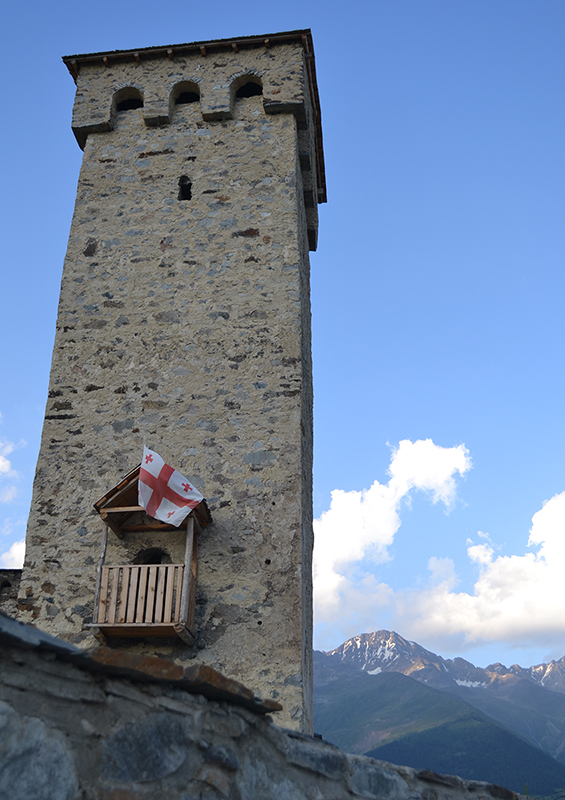
Latest news
EBRD to suspend Ombla loan disbursement until further eco studies are completed
Bankwatch in the media | 28 November, 2011The European Bank for Reconstruction and Development (EBRD) has said it would not disburse the recently-approved 123.2 million Euro loan for construction of the Ombla hydropower plant near Dubrovnik before the environmental impacts of the project are assessed.
Read moreNGOs condemn EBRD financing of biodiversity destruction in Croatia
Press release | 23 November, 2011Zagreb — Croatian environmental organisations Zelena akcija/Friends of the Earth Croatia, the Croatian Biospeleological Society, Transparency International Hrvatska, Srđ je naš, Baobab, Eko Zeleno Sunce, Brodsko ekološko društvo-BED, Center for Environment (B&H), Eko-Zadar, WWF MedPO and regional organisation CEE Bankwatch Network have described as “extremely irresponsible” the approval yesterday by the European Bank for Reconstruction and Development of a EUR 123 million loan for the construction of the Ombla underground hydropower plant near Dubrovnik. [1]
Read moreAn EBRD interpretation of biodiversity protection in the western Balkans
Blog entry | 14 November, 2011With potentially devastating impacts on natural habitats, the European Bank for Reconstruction and Development has so far offered no real commitment to environmental protection in its ambiguous decisions on two hydropower plants in Croatia and Macedonia.
Read moreRelated publications
Kungrad 1-3 wind power project, Uzbekistan
Policy comments | 11 March, 2025 | Download PDFKungrad is one of several large-scale renewable projects featuring extensive transmission lines slated for remote, wild areas in Central Asia – an alarming practice that hinders the sustainable energy transition.
How to interact with development banks lending to hydropower projects in Central Asia: A toolkit for civil society activists
Toolkit | 3 February, 2025 | Download PDFThis toolkit is aimed primarily at civil society organisations in Central Asia tackling the construction of dams or other unsustainable water infrastructure.
The Upper Horizons complex, Bosnia and Herzegovina
Briefing | 18 December, 2023 | Download PDFThe Upper Horizons hydropower complex has been planned since the mid-20th century, and is planned to consist of three plants — Dabar, Nevesinje and Bileća — linked by a series of tunnels and channels. If completed, it would have a devastating impact on the karst ecosystems of eastern Herzegovina and beyond.
